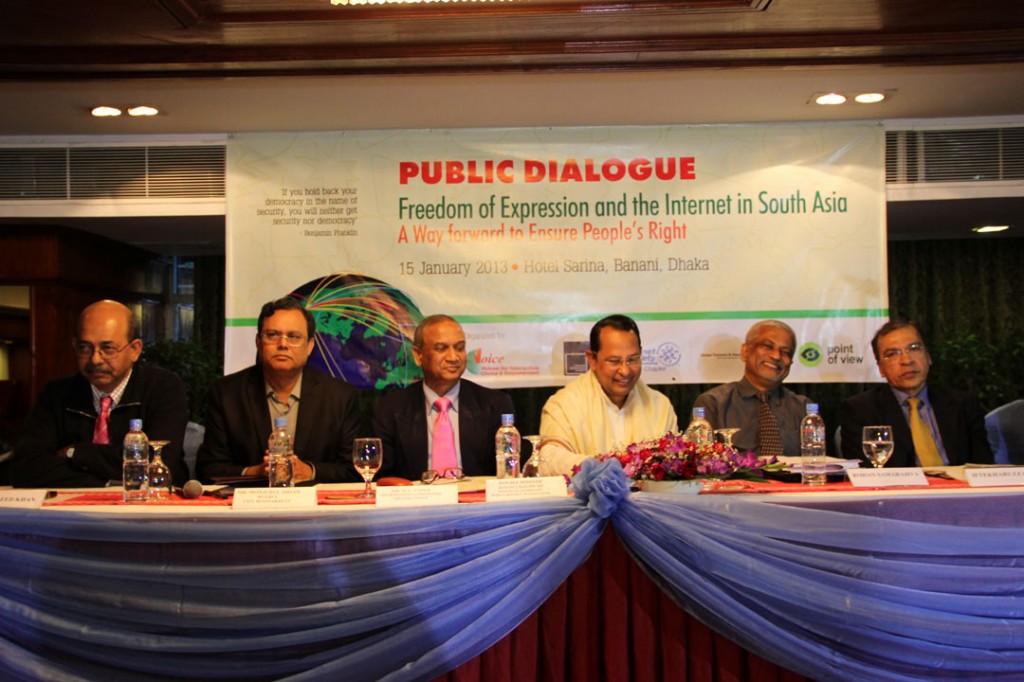Dhaka public meeting on the Internet and freedom of expression: Part 2 – #SAFoE
by Richa Kaul Padte
This blog post is ninth in a series of ten blog posts to report on the 'Third South Asian Meeting on the Internet and Freedom of Expression' recently concluded in Dhaka, Bangladesh. The blog post specifically reports on the public dialogue that concluded the two-day event.
This blog post is an overview of the second part of the public meeting, which brought together government officials, experts, activists, and bloggers to discuss issues around the right to freedom of expression and its governance on the Internet.

From left to right: panelists Abu Saeed Khan, Bulbul Ahsan, M A Taher, Minister Hasanul Haq Inu, Rohan Samarajiva and Dr. Iftekharuzzaman
Speaking from a Sri Lankan perspective, Chair and CEO of LIRNEasia Rohan Samarajiva talks about the ways in which electronic connectivity is either permitted or withdrawn in various contexts. For example, until 2008, all telephone networks were closed a day after and a day before elections in Bangladesh. What does it mean when a government intervenes in communication? Citing examples of the revolutions in the Arab world – in particular Lybia and Egypt – Samarajiva says that those governments ‘that shut down the electronic connectivity of their people – [therefore] depriving them of the ability to express themselves – cease to hold whatever position [of power] they had at the time of the shutdown.’ During the time of the Egyptian revolution, Mubarak shut down between 85 and 90 percent of the networks by what is known as ‘pulling the kill switch’. According to Samarajiva’s analysis, such a move is an illustration of the final struggle of a party’s dying power. Samarajiva called on South Asian governments to keep in mind this trend as they make their decisions on how to exert control over electronic connectivity in their countries.
The next panellist, Dr. Iftekharuzzaman – Executive Director of Transparency International Bangladesh – discusses ‘good governance’ as something that should exist both online and offline, with its defining characteristics as openness and transparency, accountability, and equal participation. ‘These fundamental characteristics must be there in order for the Internet not to backfire on us.’ Building on Bulbul’s comments about the implementation of participatory law in Bangladesh, Iftekharuzzaman says that this practice of engaging people is relatively new in the country. However, he cites the examples of two types of laws in recent times that have ensured the participation of stakeholders: the first is the RTI Act, and the second are the laws that have been driven by the civil society, including those surrounding gender issues, child rights, and anti-corruption.
Information Commissioner M.A. Taher carried on the discussion on the governance of the Internet, and states that ‘safety will be given by the state and by the law.’ He goes on to discuss the ways in which the RTI Act has been implemented, in terms of both its difficulties in the rigour demanded in the filling out of applications, as well as the number of officials who have been censured or punished through its findings.
The final panellist for the evening – the Information Minister of Bangladesh, Hasanul Haq Inu – was the meeting’s most eagerly awaited speaker as the key government representative on the issues that had been raised not just during the public meeting, but across the two day conference. He asks, ‘when discussing the Internet, who are its guardians? And [more importantly] who will guard the guardians?’ Contextualising the issues raised within a country that is transitioning from one form of governance to another, the Minister goes on to say,
When we are in transition, we have the footprints of the military dictators in the constitution. And it is up to the democrats to wipe out these footprints of the military and fundamentalists one by one. Side by side we are sitting in the debris…Setting up an elected government at the top is not democracy, it is [only] a part of democracy. We need to set up other organisations that can act as watchdogs which can serve as checks and balances for democracy [to function].
As the Minister himself points out, the debate around whether or not access to the Internet should be seen as a fundamental human right is one that is being discussed by many politicians. Here at this meeting, the Minister boldly declares that he is going to propose that the right to the Internet is included in the Bangladeshi constitution – a statement that brings him much applause from the audience. Building on earlier conversations about the need for government officials and politicians to recognise the importance and potential of the Internet, the Minister states, ‘power flows out of the barrel of a gun, the ballot paper, and now, the click of the mouse. ICTs are weapons of mass liberation.’
Closing the meeting and two day conference, Anja Kovacs from the event’s India-based organising partner, the Internet Democracy Project, reiterates the importance of the Minister’s declaration on the right to the Internet. She thanks the government of Bangladesh for not only allowing the meeting to take place, but for actively attending it, thus making possible a much-needed conversation across stakeholder groups on Internet governance in the region.
Contextualising the painful relevance of the meeting in light of the attack on blogger Asif Mohiuddin, Kovacs says that
the right to freedom of expression is not about saying things we all agree on. The right to shock, insult and offend are an integral part of the right to freedom of expression, [whereas] the right to hate or incite violence are not.
She goes on to praise Asif for speaking fearlessly even on topics that are not popular in his society, and closes the meeting with the statement of solidarity with Asif and Bangladeshi bloggers written by participants from the meeting earlier in the day. The statement can be found here.